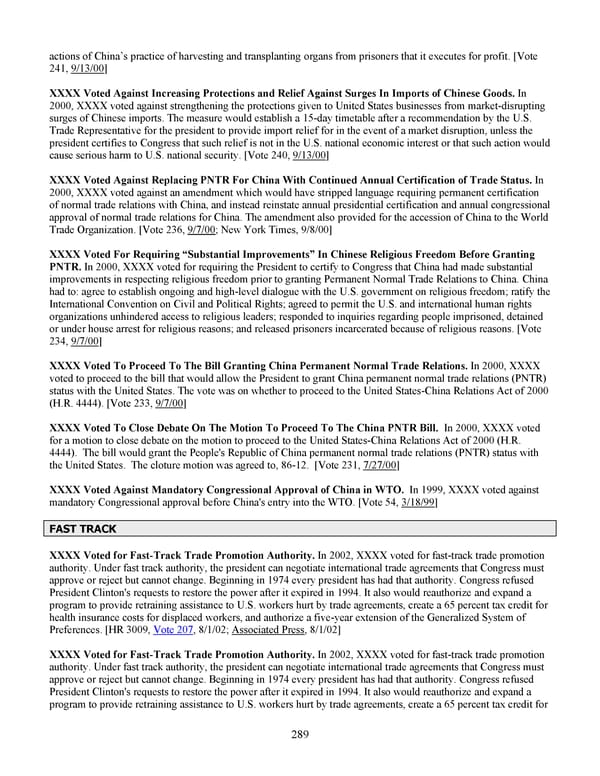actions of China’s practice of harvesting and transplanting organs from prisoners that it executes for profit. [Vote 241, 9/13/00] XXXX Voted Against Increasing Protections and Relief Against Surges In Imports of Chinese Goods. In 2000, XXXX voted against strengthening the protections given to United States businesses from market-disrupting surges of Chinese imports. The measure would establish a 15-day timetable after a recommendation by the U.S. Trade Representative for the president to provide import relief for in the event of a market disruption, unless the president certifies to Congress that such relief is not in the U.S. national economic interest or that such action would cause serious harm to U.S. national security. [Vote 240, 9/13/00] XXXX Voted Against Replacing PNTR For China With Continued Annual Certification of Trade Status. In 2000, XXXX voted against an amendment which would have stripped language requiring permanent certification of normal trade relations with China, and instead reinstate annual presidential certification and annual congressional approval of normal trade relations for China. The amendment also provided for the accession of China to the World Trade Organization. [Vote 236, 9/7/00; New York Times, 9/8/00] XXXX Voted For Requiring “Substantial Improvements” In Chinese Religious Freedom Before Granting PNTR. In 2000, XXXX voted for requiring the President to certify to Congress that China had made substantial improvements in respecting religious freedom prior to granting Permanent Normal Trade Relations to China. China had to: agree to establish ongoing and high-level dialogue with the U.S. government on religious freedom; ratify the International Convention on Civil and Political Rights; agreed to permit the U.S. and international human rights organizations unhindered access to religious leaders; responded to inquiries regarding people imprisoned, detained or under house arrest for religious reasons; and released prisoners incarcerated because of religious reasons. [Vote 234, 9/7/00] XXXX Voted To Proceed To The Bill Granting China Permanent Normal Trade Relations. In 2000, XXXX voted to proceed to the bill that would allow the President to grant China permanent normal trade relations (PNTR) status with the United States. The vote was on whether to proceed to the United States-China Relations Act of 2000 (H.R. 4444). [Vote 233, 9/7/00] XXXX Voted To Close Debate On The Motion To Proceed To The China PNTR Bill. In 2000, XXXX voted for a motion to close debate on the motion to proceed to the United States-China Relations Act of 2000 (H.R. 4444). The bill would grant the People's Republic of China permanent normal trade relations (PNTR) status with the United States. The cloture motion was agreed to, 86-12. [Vote 231, 7/27/00] XXXX Voted Against Mandatory Congressional Approval of China in WTO. In 1999, XXXX voted against mandatory Congressional approval before China's entry into the WTO. [Vote 54, 3/18/99] FAST TRACK XXXX Voted for Fast-Track Trade Promotion Authority. In 2002, XXXX voted for fast-track trade promotion authority. Under fast track authority, the president can negotiate international trade agreements that Congress must approve or reject but cannot change. Beginning in 1974 every president has had that authority. Congress refused President Clinton's requests to restore the power after it expired in 1994. It also would reauthorize and expand a program to provide retraining assistance to U.S. workers hurt by trade agreements, create a 65 percent tax credit for health insurance costs for displaced workers, and authorize a five-year extension of the Generalized System of Preferences. [HR 3009, Vote 207, 8/1/02; Associated Press, 8/1/02] XXXX Voted for Fast-Track Trade Promotion Authority. In 2002, XXXX voted for fast-track trade promotion authority. Under fast track authority, the president can negotiate international trade agreements that Congress must approve or reject but cannot change. Beginning in 1974 every president has had that authority. Congress refused President Clinton's requests to restore the power after it expired in 1994. It also would reauthorize and expand a program to provide retraining assistance to U.S. workers hurt by trade agreements, create a 65 percent tax credit for 289
 HRC vote skeleton Page 312 Page 314
HRC vote skeleton Page 312 Page 314